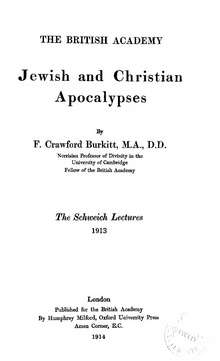Francis Crawford Burkitt
Francis Crawford Burkitt (3 September 1864 – 1935) was a British theologian and scholar. He was Norris Professor of Divinity at the University of Cambridge, from 1905 until shortly before his death. Burkitt was a sturdy critic of the notion of a distinct "Caesarean Text" of the New Testament put forward by B. H. Streeter and others.
He was educated at Harrow School and Trinity College, Cambridge, where he read mathematics, graduating B.A. as 28th Wrangler (University of Cambridge) in 1886, and gained a first-class in the theological tripos in 1888.[1]
Burkitt accompanied Robert Bensly, James Rendel Harris, and sisters Agnes and Margaret Smith on the 1893 expedition to Saint Catherine's Monastery in Egypt to examine a Syriac palimpsest of the Gospels discovered there the previous year by the two sisters. Burkitt played an important role in deciphering the text, and in subsequent publication of the team's findings.[2]
Burkitt was a noted figure at Cambridge in 1912–35 for his chairmanship of the Cambridge New Testament Seminar, attended by other prominent theologians, including Robert Newton Flew, who left an account of it in an obituary for Burkitt in the Proceedings of the British Academy.[3]
The Burkitt Medal, awarded by the British Academy, is named in his honour.[4]
Works

(The Schweich Lectures (1913).
- The Book of Rules of Tyconius (1894)
- The four Gospels in Syriac, transcribed from the Sinaitic palimpsest (1894) with Robert L. Bensly and J. Rendel Harris, introduction by Agnes Smith Lewis (1894)
- The New Testament in Greek (1896), editor of second edition
- The Old Latin and the Itala (1896)
- Fragments of the Books of Kings according to the Translation of Aquila (1897)
- Notes. Saint Mark XV in codex k,[5] JTS 1900, ss. 278-279.
- Two Lectures on the Gospels (1901)
- Saint Ephraim's Quotations From The Gospel (1901)
- Criticism of the New Testament: St. Margaret's Lectures (1902) with Frederic G. Kenyon, A. C. Headlam and others
- Early Eastern Christianity: Saint Margaret's Lectures on the Syriac Speaking Church (1904)
- Further Notes on codex k,[6] JTS 1904, ss. 100-107.
- Evangelion da-mepharreshe: The Curetonian Version of the Four Gospels, with the readings of the Sinai Palimpsest. I. Text; II: Introduction and Notes (1904)
- The Gospel History and its Transmission (1907)
- Codex Alexandrinus, JTS XI (Oxford, 1909–1910), pp. 663–666.
- Jewish and Christian Apocalypses (1914) Schweich Lectures of the British Academy 1913
- The Religion of the Manichees (1925) Donnellan Lectures 1924
- Palestine in General History (1929) Schweich Lectures 1926, with Theodore H. Robinson, J. W. Hunkin
- Christian Worship (1930)
- The Church of Today Part 2 (1930) with P. Gardner-Smith and C. E. Raven, The Christian Religion and Its Origin and Progress, Volume 3
- Jesus Christ: An Historical Outline (1932)
- Church and Gnosis : a Study of Christian Thought and Speculation in the Second Century (1932)
- Franciscan Essays II (1932) with H. E. Goad and A. G. Little
- The Dura Fragment of Tatian. JTS 36 (Oxford, 1935): 192–293.
- Early Christianity Outside the Roman Empire (2002)
- Egyptian Gnostic Works (2005)
- Christian Beginnings: Three Lectures (2005)
References
- ↑ "Burkitt, Francis Crawford (BRKT882FC)". A Cambridge Alumni Database. University of Cambridge.
- ↑ Soskice, Janet (2010) Sisters of Sinai: How Two Lady Adventurers Found the Hidden Gospels. London: Vintage, 146 - 187
- ↑ His account is quoted at length in Suffering and Martyrdom in the New Testament, ed. William Horbury and Brian McNeill (Cambridge: Cambridge UP), pp. xiii-xv.
- ↑ "Burkitt Medal (Biblical Studies)". Prizes and Medals. British Academy. Retrieved 24 August 2015.
- ↑ "Journal of theological studies".
- ↑ "Journal of theological studies".
External links
-
 Works written by or about Francis Crawford Burkitt at Wikisource
Works written by or about Francis Crawford Burkitt at Wikisource - Biographical page